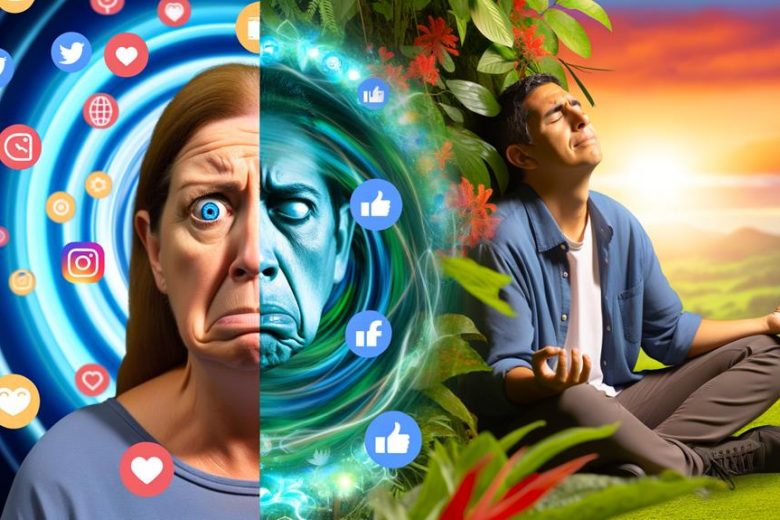You might think social media is just a harmless way to stay connected, but have you ever considered how it really affects mental health? Sure, it offers supportive communities and a sense of belonging, yet it also brings anxiety, depression, and cyberbullying, particularly among adolescents. The pressure to maintain a flawless online persona and the constant comparison to others can deeply affect self-esteem. Let's look at these issues more closely and explore some strategies that could help mitigate these negative effects, making your online experience healthier.
Contents
Overview of Social Media's Impact
Social media has undeniably transformed the way we communicate and access information, but its impact on mental health is a double-edged sword. On one hand, it offers a platform for global connection and information sharing, potentially enhancing well-being through supportive online communities. However, the negative consequences are equally significant and well-documented.
Research shows a strong link between excessive social media usage and increased rates of anxiety and depression, particularly among adolescents who spend more than 180 minutes per day online. This extensive usage often leads to feelings of loneliness and psychological distress. The nature of online interactions plays a vital role in shaping mental health outcomes. Positive interactions can foster a sense of community and support, whereas toxic environments and cyberbullying contribute to severe psychological issues, including heightened anxiety and depression among victims.
A significant factor contributing to the negative impact of social media on mental health is social comparison. Platforms like Instagram and Facebook are filled with curated highlight reels, causing users to compare their lives to seemingly perfect portrayals of others. This constant comparison can result in diminished self-esteem and body image issues. The pressure to measure up to these unrealistic standards exacerbates feelings of inadequacy and contributes to mental health problems.
Moreover, the prevalence of cyberbullying on social media has led to severe psychological distress for many users. Victims often experience heightened anxiety and depression, further complicating their mental health landscape. While social media has the potential to create positive online interactions and support networks, its role in fostering anxiety, depression, and feelings of loneliness cannot be ignored. The dual nature of social media's impact on mental health necessitates a balanced and mindful approach to its usage.
Social Media Addiction
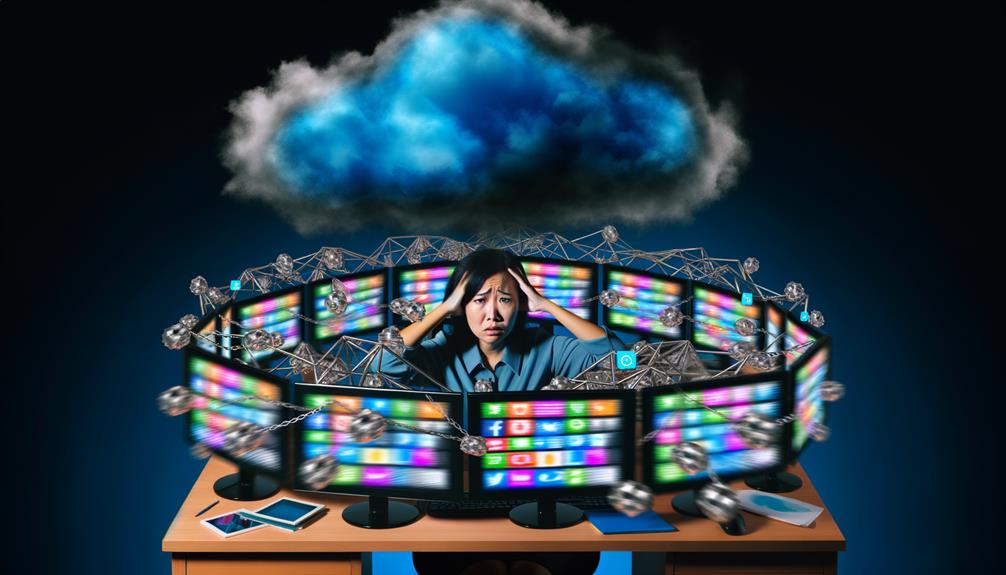
While the dual impact of social media on mental health is evident, another pressing issue is the rise of social media addiction. Characterized by excessive use, this addiction often leads to neglect of real-life responsibilities and relationships. Studies indicate that individuals spending over 180 minutes daily on social media are at a higher risk of experiencing depression.
The prevalence of social media addiction among teenagers is particularly concerning, with many adolescents dedicating upwards of 7 hours per day online. This extended screen time can disrupt sleep patterns and contribute to mental health issues like anxiety and depression. The need for continuous connectivity and validation through likes and comments creates a cycle of dependency. Users increasingly seek affirmation online, leading to a decline in self-esteem and heightened feelings of inadequacy when engagement is low.
| Factor | Impact |
|---|---|
| Excessive Screen Time | Disrupted sleep patterns |
| Continuous Connectivity | Increased anxiety and depression |
| Need for Validation | Decline in self-esteem |
| Unhealthy Coping Mechanisms | Exacerbated mental health issues |
| Diminished Face-to-Face Skills | Increased feelings of social isolation |
Research highlights that social media addiction fosters unhealthy coping mechanisms. Individuals often turn to social media for distraction or escape from stressors, exacerbating underlying mental health conditions. The compulsive nature of checking notifications and engaging with content can lead to behavioral changes. This results in diminished face-to-face communication skills and increased feelings of loneliness, despite being constantly connected online.
Cyberbullying and Mental Health
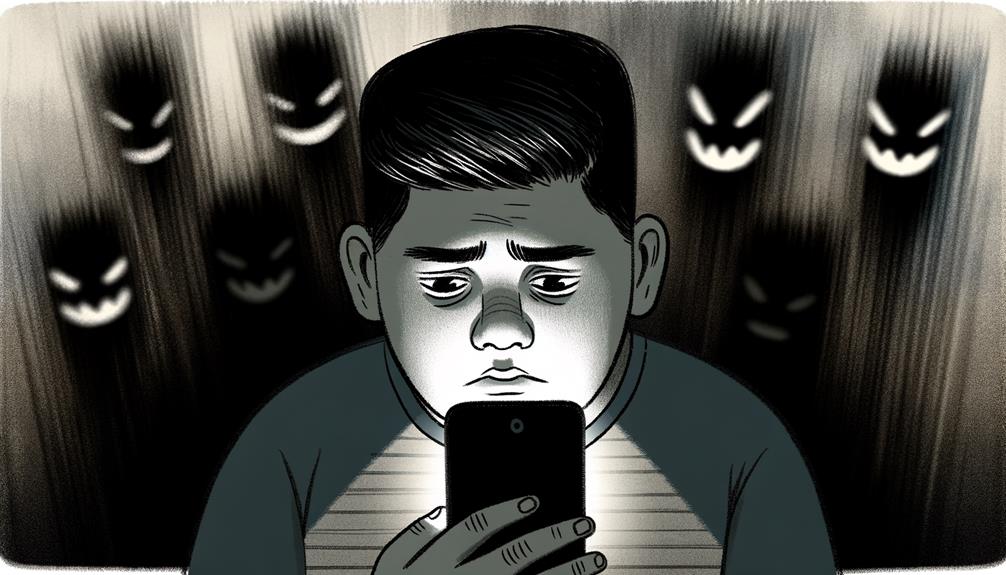
You can't ignore the prevalence of cyberbullying on social media, with around 15% of high school students affected, leading to significant emotional distress. Victims often face severe psychological impacts, such as increased anxiety, depression, and suicidal thoughts, which are more than twice as common compared to their non-bullied peers. Addressing this issue requires collaborative prevention and support efforts involving parents, educators, and policymakers, as effective programs can reduce incidents by up to 25%.
Prevalence and Forms
In today's digital age, the prevalence of cyberbullying has surged, with approximately 37% of students aged 12-17 experiencing online harassment. Social media platforms have become breeding grounds for cyberbullying, contributing to significant mental health issues among adolescents. Research shows that victims of cyberbullying often face negative consequences, including heightened levels of anxiety and depression. Specifically, online harassment can lead to a 20% increase in depressive symptoms among affected individuals.
The anonymity provided by these platforms emboldens bullies, making it easier for them to target their peers without fear of immediate repercussions. Consequently, over 50% of adolescents report having witnessed incidents of cyberbullying. The mental health impact is profound, with victims feeling isolated and unsupported. About 60% of them don't inform adults about their experiences, exacerbating their struggles.
Studies indicate that victims of cyberbullying are 2 to 9 times more likely to contemplate suicide than their non-bullied peers. This alarming statistic underscores the urgency of addressing the pervasive issue of cyberbullying on social media platforms. Without adequate intervention, the prevalence of online harassment will likely continue to contribute to the deteriorating mental health of adolescents.
Psychological Impact
Cyberbullying's psychological impact on adolescents is both profound and troubling, as evidenced by increased rates of anxiety, depression, and suicidal thoughts among victims. The prevalence of cyberbullying, reported by approximately 34% of students, reflects how greatly social media affects mental health outcomes. The anonymity provided by these platforms often emboldens individuals to engage in harmful behaviors, leading to severe psychological consequences for victims.
Victims of cyberbullying experience heightened levels of emotional distress and feelings of hopelessness. Research shows they're 2 to 9 times more likely to contemplate suicide compared to non-victims, highlighting the negative effects of social media on their well-being. The impact of social media in facilitating these harmful interactions can't be underestimated.
To understand the gravity of cyberbullying's psychological consequences, reflect on the following:
- Increased Anxiety and Stress: Victims often exhibit signs of heightened anxiety and stress due to constant online harassment.
- Depression: Prolonged exposure to cyberbullying leads to severe depressive symptoms.
- Suicidal Thoughts: There's a marked increase in suicidal ideation among cyberbullying victims.
- Emotional Distress: Persistent cyberbullying results in considerable emotional turmoil and psychological instability.
It's clear that the negative effects of social media on mental health are substantial and require serious attention.
Prevention and Support
Given the severe psychological impact of cyberbullying on adolescents, addressing prevention and support mechanisms becomes imperative. Cyberbullying has become increasingly prevalent with the rise of social media, affecting approximately 15% of high school students annually. This form of bullying leads to significant mental health issues, including anxiety and depression. Victims experience heightened stress and are 2 to 9 times more likely to engage in self-harm behaviors compared to their peers.
The anonymity of social media platforms emboldens bullies, exacerbating feelings of hopelessness in victims. Effective prevention strategies are essential and include educational programs that promote digital literacy and empathy. Teaching young users about responsible online behavior and the consequences of cyberbullying can mitigate its impact. Encouraging open communication about online experiences is also important.
Support systems play a fundamental role in recovery. Counseling services and peer support groups have been shown to improve mental health outcomes for victims of cyberbullying. These systems emphasize the importance of community and professional assistance, helping victims navigate their experiences and reduce the mental health toll. Addressing cyberbullying through thorough prevention and support strategies is vital for safeguarding adolescents' mental health.
Comparison and Self-Esteem Issues
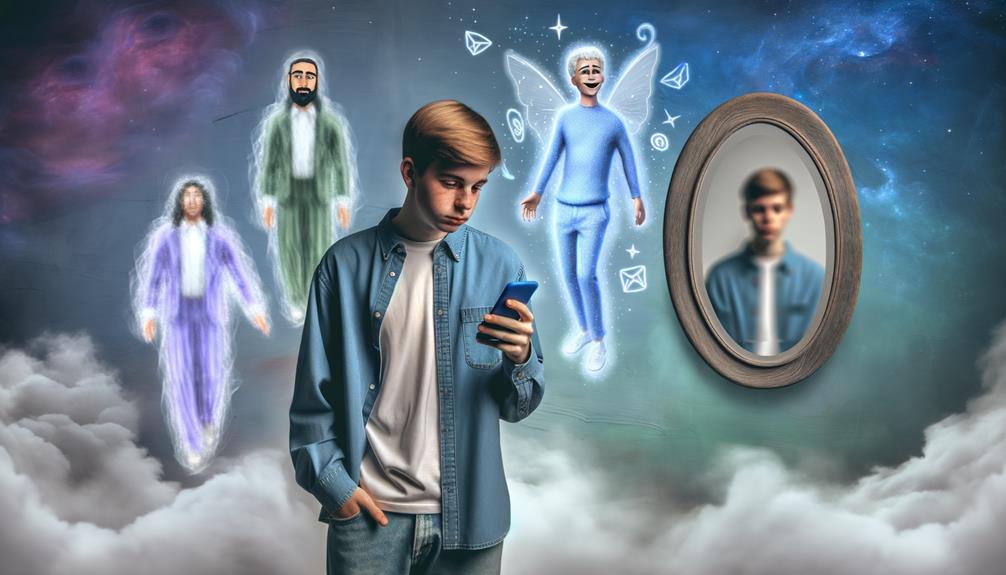
When you scroll through social media, you're often bombarded with curated content that sets unrealistic beauty standards, leading to harmful comparisons. The pressure to maintain an ideal online persona can increase anxiety as you're constantly seeking validation through likes and comments. Research shows that this cycle of comparison and validation greatly impacts self-esteem, particularly among adolescents.
Unrealistic Beauty Standards
Scrolling through social media feeds, you're often bombarded with highly curated images that set unrealistic beauty standards, leading to constant comparisons and self-esteem issues. Social media use, particularly platforms like Instagram, can negatively impact your body image. A study revealed that 70% of women feel pressure to conform to these standards, which greatly affects their self-esteem and can cause body dissatisfaction.
Research highlights that exposure to these idealized images correlates with increased body dissatisfaction and can even lead to severe disorders such as anorexia and bulimia among young women. This phenomenon, often referred to as "Instagram dysmorphia," describes individuals developing a distorted self-image and seeking cosmetic procedures to resemble their favorite social media influencers.
Key Facts:
- Unrealistic Beauty Standards: Social media often showcases idealized beauty, leading to harmful self-comparisons.
- Impact on Self-Esteem: 70% of women feel pressured to meet these standards, affecting their self-worth.
- Body Dissatisfaction: Exposure to idealized images correlates with increased body dissatisfaction and eating disorders.
- Instagram Dysmorphia: Many develop distorted self-images, seeking cosmetic procedures to match influencer looks.
These factors collectively indicate that social media use can greatly harm mental health by promoting unrealistic beauty standards and fostering constant comparing.
Online Persona Pressure
Although it may seem harmless, the pressure to maintain a flawless online persona often leads individuals to curate an idealized version of their lives, fostering unrealistic expectations and feelings of inadequacy when compared to others' highlight reels. This phenomenon, known as online persona pressure, notably impacts mental health by promoting constant social comparison. Research indicates that frequent engagement in upward social comparison on social media correlates with lower self-esteem and heightened anxiety and depression.
Adolescents, in particular, are vulnerable. Studies reveal that those spending more than three hours daily on social media face a higher risk of mental health issues, including body image dissatisfaction and depressive symptoms. The drive for external validation, through likes and comments, exacerbates these problems, linking self-worth to online engagement. When such validation is absent, feelings of loneliness and low self-esteem intensify.
Additionally, exposure to meticulously curated content can lead to body dysmorphia and even suicidal thoughts among youth. The constant comparison to seemingly perfect lives and appearances sets unrealistic expectations, contributing to a cycle of dissatisfaction and mental health decline. Therefore, online persona pressure is a critical factor in the broader discourse on social media's impact on mental health.
Validation Through Likes
The pursuit of validation through likes on social media is a pervasive issue that greatly impacts mental well-being. When you tie your self-worth to the number of likes or comments your posts receive, it can result in heightened anxiety and stress levels, particularly when engagement falls short of expectations. Research shows that users experiencing fewer interactions often feel lower self-esteem and a sense of inadequacy compared to those receiving more engagement.
Social media comparison exacerbates this problem, especially among adolescents who are at higher risk of developing body image issues and depressive symptoms. The pressure to present a curated, appealing online persona can lead to:
- Increased anxiety and stress when posts don't meet expected engagement levels.
- Lower self-esteem due to fewer likes, fostering feelings of inadequacy.
- Body image issues and depressive symptoms from constant social media comparison.
- A feedback loop of external affirmation, making the need for validation addictive.
This "like culture" promotes unhealthy comparisons, causing you to measure your real life against others' idealized versions, leading to envy and dissatisfaction. Ultimately, this cycle can severely undermine your mental health, particularly if you're a teenager, making it essential to seek healthier forms of validation.
Fear of Missing Out (FOMO)
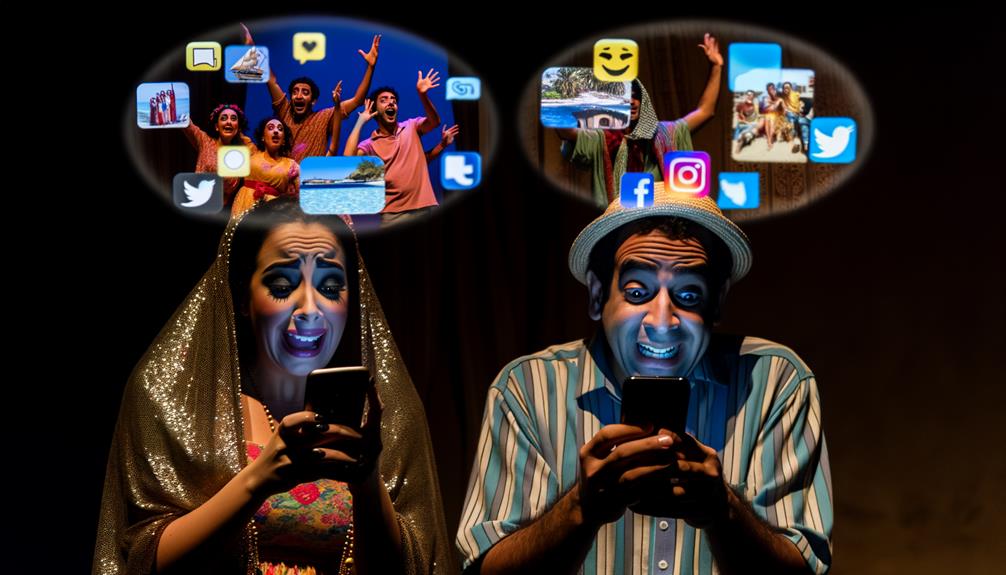
When you constantly check social media for updates, you might find yourself experiencing Fear of Missing Out (FOMO), a phenomenon that social media greatly exacerbates. FOMO is fueled by the curated nature of social media posts, which often portray an idealized version of others' lives. This can lead to anxiety and negative emotions as you compare your own experiences to those seemingly perfect moments shared online.
| Impact on Mental Health | Explanation |
|---|---|
| Anxiety | FOMO increases anxiety by making you feel like you're missing out on exciting experiences. |
| Loneliness | Seeking validation through social media interactions can leave you feeling isolated. |
| Negative Emotions | Constant comparisons foster feelings of inadequacy and envy. |
Studies indicate that frequent social media usage can heighten FOMO, contributing to increased stress and lower life satisfaction. The incessant need to check for updates and stay connected can lead to compulsive social media usage, disrupting sleep patterns and overall mental health. This cycle of compulsive behavior is driven by the fear of exclusion, where you feel pressured to remain engaged in online activities to avoid missing out.
Additionally, FOMO is closely linked to a cycle of negative emotions. The fear of being left out drives you to seek validation through social media interactions, which might provide short-term relief but ultimately result in greater feelings of loneliness and isolation. The constant pursuit of online validation can erode your self-worth and foster a persistent sense of inadequacy.
Strategies for Mental Health
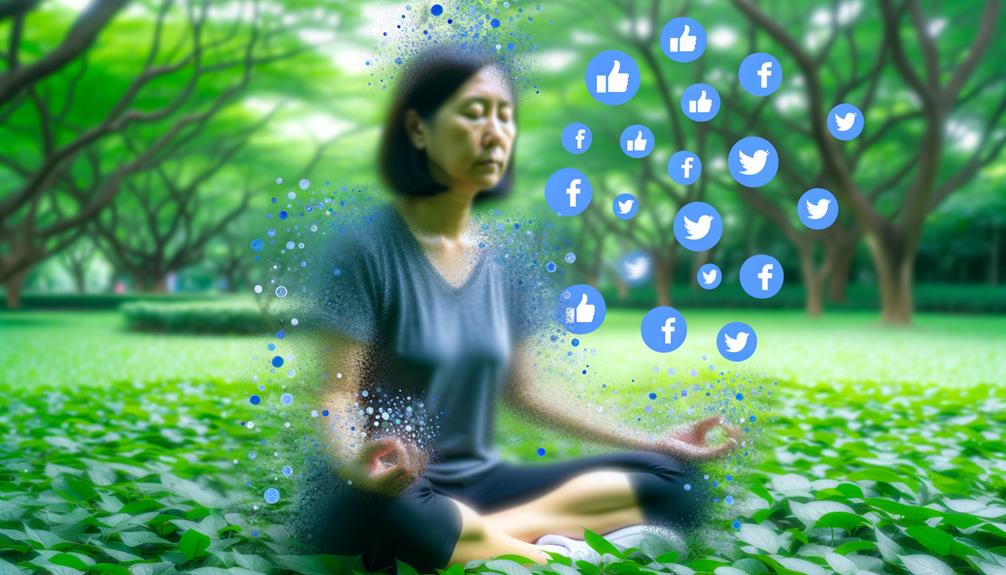
Often, effective strategies for maintaining mental health while using social media start with setting clear boundaries. Limiting your screen time can notably reduce anxiety and depressive symptoms. Studies show that keeping social media use under 30 minutes per day correlates with improved mental well-being. Here are some strategies you can implement:
- Set Screen Time Limits: Establish daily limits for social media use. There are apps available that can help you monitor and control your screen time, reducing the risk of mental health challenges.
- Engage in Offline Activities: Balance your online interactions with real-life activities. Engaging in hobbies or sports can foster real-life relationships and provide a sense of fulfillment that digital interactions might lack.
- Enhance Digital Literacy: Participate in educational programs that teach you how to navigate social media responsibly. These programs can empower you to recognize and mitigate negative content, thereby fostering healthier online habits.
- Practice Mindfulness: Be mindful of how social media makes you feel. Taking breaks and focusing on positive interactions can help you avoid the stress of social comparison, promoting better mental well-being.
Creating a supportive environment is also essential. Encourage open discussions about digital well-being among your peers and family. Sharing experiences and strategies can help everyone address the mental health challenges associated with social media use more effectively.
Conclusion
To sum up, social media's impact on mental health is multifaceted. While it can foster supportive communities, excessive use often leads to anxiety, depression, and cyberbullying, exacerbating psychological distress. Unrealistic beauty standards and the pressure to maintain a perfect online persona contribute to low self-esteem and body image concerns. Implementing strategies like screen time management and promoting digital literacy can mitigate these adverse effects, supporting healthier online interactions and improved mental well-being.
